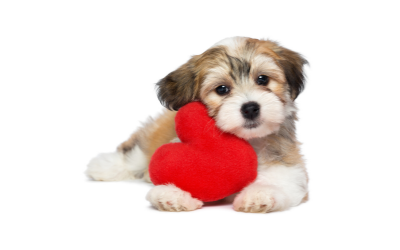
Tomorrow is Valentine’s Day! A day to celebrate love–whether with your partner, family, or your four-legged friends! While Valentine’s Day is filled with treats, including chocolates, candies, flowers, and balloons, these items can pose serious health risks to our furry friends.
Don’t share chocolate or candies with your pet–more for you! Be sure to keep balloons, flowers or plants! Instead, pamper your dog with an extra walk, a game of fetch, or engage your cat with a catnip toy, a feather chase game, or long snuggle! that tie balloons or flowers out of reach
Chocolate. Keep the salted dark chocolate to yourself! Chocolate contains caffeine and theobromine, both of which are toxic to dogs and cats. White and milk chocolates have lower amounts of theobromine than dark or bittersweet chocolate – in other words, the darker the chocolate, the more danger it poses. As little as 1 ounce of dark, bittersweet, or gourmet dark chocolate can cause toxic effects in a mid-sized dog or cat. Symptoms of chocolate poisoning are vomiting, diarrhea, increased thirst, and restlessness. In severe cases, seizures and heart failure can occur.
Candies. Many unsweetened candies and gum, as well as “diet” baked goods contain xylitol as a sweetener. Even some peanut and nut butters contain xylitol! Xylitol is completely safe for humans, but it’s extremely toxic to dogs. Dogs that ingest even small amounts of xylitol can experience low blood sugar, seizures, liver failure, and even death. Just a few pieces of gum may contain enough xylitol to kill a small dog. Signs of xylitol poisoning develop within 15 minutes of ingestion, and may include vomiting, weakness, lack of coordination, tremors, seizures, and coma. The most recent information shows that xylitol is not known to be toxic to cats, but since it’s always better safe than sorry, keep all candies and sweets away from dogs and cats! Be sure to check the labels of your peanut or nut butter for xylitol before giving your pooch a spoonful treat.
Plants and flowers. Some plants are toxic to pets. While some may cause minor gastrointestinal upset, others are potentially deadly. Lilies are especially toxic to cats, causing kidney failure, so be sure to keep lilies out of Valentine’s Day arrangements. All parts of the lily (pollen, leaves, and flower petals) can result in kidney failure in cats. Even water in the vase is toxic. Luckily roses, everyone’s favorite Valentine’s bouquet, are non-toxic to dogs and cats – just be sure to have those pesky thorns removed!
Balloons and ribbon. Even a bouquet of balloons can pose a threat to your pets. Balloons can be a source of play for curious pets! While balloons may seem like a fun toy to play with, if the balloons break and pieces are ingested, they can become lodged in your pet’s digestive tract. Likewise, ribbons used to tie the balloon bouquet can be enticing to a pet. If ribbon is consumed, it can become lodged at some point in the gastrointestinal tract causing what’s known as a linear foreign object – a life-threatening condition that requires surgery to treat.
This Valentine’s Day, keep all candies, chocolates, baked goods, flower and balloon bouquets out of reach and away from curious pets. If you suspect that your pet has eaten a toxic product, contact your veterinarian right away. Your pet has a better chance of recovery if treated early.